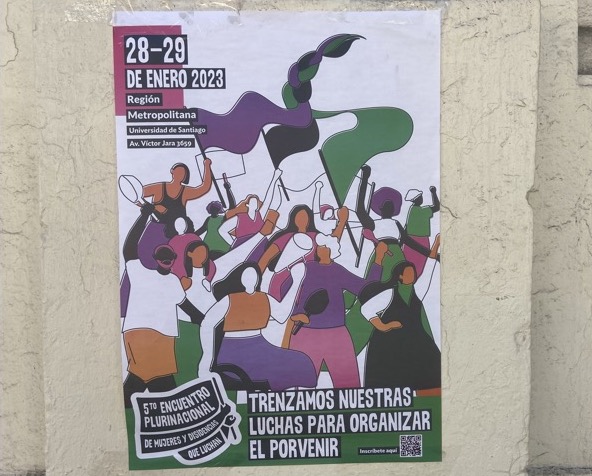(SANTIAGO, Chile) — Following a January summit organized by Chile’s most powerful women’s group Coordinadora Feminista 8m (CF8M), Chilean feminists decided to strike for International Women’s Day on March 8. They also committed to reviving Chile’s feminist movement after a demoralizing year for supporters of women’s rights.
Hundreds of people supporting women’s and LGBTQ+ rights gathered at the main campus of Santiago University Jan. 28-29 to reframe and refocus Chile’s feminist movement. The weekend, sponsored by more than 40 social organizations, featured workshops, artistic and cultural presentations, a women’s craft fair, and photo exhibitions among other activities.
Javiera “Ameba” Contreras, a member of the Human Rights Committee of the CF8M and the general coordinator of the gathering, said the summit on January 28-29th had many objectives, one of which was “to reestablish what our petitions are so that we may uplift them during the feminist strike on March 8.”
Founded in 2016, CF8M was founded to organize International Women’s Day and its corresponding march in Chile (although it soon grew and took on many more challenges). As in many places around the globe, Chilean women flood the streets to mark the day and bring visibility to women’s issues and feminist ideals. The CF8M exhorts women to march and strike to draw attention to the vital contributions of women.
Contreras noted that organizers had staged the first in-person gathering since the pandemic. They also had to deal with the “plebitusa,” a play on words combining “plebiscite” and “Tusa,” -a popular Nicki Minaj and Karol G song about heartbreak and crumbling hopes. The heartbreak is a reference to the Chilean people’s decision in September 2022 to reject a new constitution proposed by the Constituent Assembly, a text informed by feminist ideals defending rights such as abortion and gender parity in collegiate bodies.
To address these setbacks, and overcome “plebitusa,” the attendees concluded that the Feminist General Strike was especially necessary for this year’s International Women’s Day. In their final summary of the summit, organizers stated their intention “to affirm that 50 years after the [Chilean military] coup, we are still here, that they have not beaten us and that we need to continue acting together to change this reality, in which women and LGBTQ+ people see the worst face of impoverishment and violence.”


